#Tom riddle meta
Explore tagged Tumblr posts
Note
Voldemort could become stupid because of the Horcruxes? Young Tom is cunning and smart. Harry defeated him very easily.
Yeah, arguably Diary Riddle is the most powerful. He’s able to wreak so much havoc and he’s so great at manipulation that even once they’re down in the Chamber with Ginny nearly dead, he has to be like “Harry I’m evil. We can’t run away because I’m evil. Stop trying to help me I’m trying to KILL YOU.”
Diary Riddle also executes his entire plan himself. It’s not like he’s having Ginny do stuff for him, he’s possessing her and doing it himself. No other iteration of Voldemort is so self sufficient. Sorcerer’s Stone Voldemort isn’t even possessing Quirrel, he’s just living on the back of his head and yelling at him.
I don’t think that Voldemort becoming seemingly dumber over time has anything to do with the Horcruxes though. Young Tom is used to having obstacles. He’s a harder worker because he has to be! He’s an orphan with no money and no reputation. (Well he does have a reputation, in the 1940s at least, for being a polite, good student, but that’s not exactly helpful for evil purposes.) Older Voldemort has just gotten lazy because he’s so used to having power. He relies too much on the Death Eaters for things that younger Tom would NEVER trust anyone with. Voldemort’s issue is that he’s so used to being the top of the food chain that things that would used to register as threats just don’t, and those are the things that gets him.
I think that it’s pretty clear in the books that the Horcruxes do not, in themselves, have an effect on the psyche. Of course, killing people and doing a dark ritual DOES have an effect on the psyche, but the Horcrux in and of itself is not the thing making Voldemort dumber. His ego is doing that.
105 notes
·
View notes
Text
I find it incredibly creepy how Dumbledore views Riddle as being this sort of inherently seductive 'femme fatale' type. In book 6 he implies that Tom used his looks to endear himself to his teachers when he started school and hide his supposedly inherently evil and corrupt nature.
Like. Albus. DUDE. Tom was ELEVEN. Why would you assume that teachers would be swayed by or even paying attention to the attractiveness of an eleven year old?! WTAF?
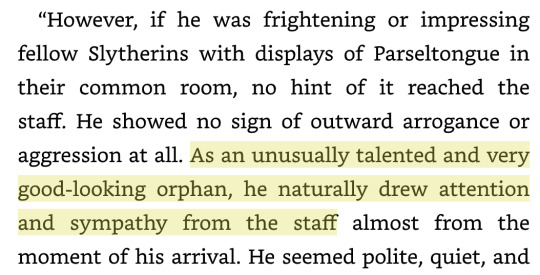
And then he portrays the Hepzibah Smith memory as another example of Tom using his seductive charms for evil. But although he does bring her flowers he doesn't do anything else to encourage her and in fact seems uncomfortable and determined to keep the conversation focused on work.
She is actually the one who is being creepy here given the power differential between them. I mean, yes, Tom is putting up with her because it suits his designs for the moment and could and would kill her in a second if provoked. But even though we know that she certainly doesn't. As far as she knows she's creeping on this young store clerk without wealth or connections whose job depends on keeping her happy.
And certainly while she enjoys his looks and his attention she also seems quite happy with the persona he puts on where he addresses her in a highly respectful manner, not as an equal. She's certainly not complaining about how he calls her Miss Hepzibah or asking him to drop the honorific. She likes that. She likes that he addresses her not much differently than how her House Elf does. She likes his whole "I am only a poor assistant, madam, who must do as he is told" thing. And as far as she knows he is just that, with no particular special power or talent other than his good looks which she evidently appreciates. This is not him leading on and taking advantage of an innocent sweet old lady.
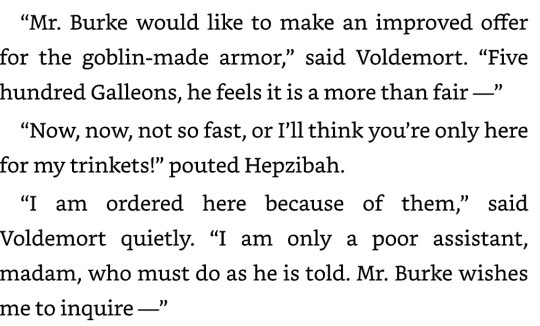
And yes he brings her flowers, presumably to keep her happy, but other than that he tries to keep the conversation professional and steer the discussion towards the purpose of his visit. He doesn't say anything overtly flirtatious or even try to prolong their discussion by asking to see some of her other things.
She brings that up on her own. Nor is there any indication that he is the one that decided to move their relationship in this direction. It seems more like she saw a young and good looking man, apparently far below her in terms of station and magical power, and made her move. He probably isn't the first.

The way she casually touches him is just so creepy to me. And though he tolerates it, he did nothing to encourage or solicit it. Riddle is someone who is in general quite averse to touch. We only see him voluntarily touch one person in 7 books and that's when he touches Harry, just for a second in book 4, just to show that he can. I don't think he enjoys this kind of attention. He was probably glad to kill her for more than just the purpose of getting the cup and the locket.
And yet none of her creepiness is acknowledged. Instead, Dumbledore draws our attention to how Riddle cruelly seduced and murdered a nice old lady whose affections he sought and then betrayed:


#Hepzibah Smith#Tom Riddle#Albus Dumbledore#do i need to tag#anti albus dumbledore#Tom Riddle meta#Harry Potter meta#my meta#Harry Potter#meta#my post#Dumbledore meta
641 notes
·
View notes
Note
don't you think Tom Riddle and Voldemort are kind of like two alters of someone with DID?
It would be interesting to read a meta about this topic, even though I don't agree. I do think that Voldemort was Tom Riddle's alter ego, but not in terms of a distinct personality, but rather the distortion and elevation of the self that he consciously molded in himself to a certain extent. There is no clear evidence that Voldemort was a second personality, not least because he is precisely what Tom most sought to become (the symbolism of self-destruction through the pursuit of immortality). So, I don't think DID is the best correlation for him.
I see Tom as having traits associated with NPD (narcissistic personality disorder). It is more self-delusion than dissociation. He seeks superiority and sees himself as superior, but deep down, his self-hatred and aversion to his very being were so intense that I can understand the whole work as Voldemort fighting more against himself than merely against Harry. His insecurities about his self-worth and his relentless pursuit of individual power could not be equaled, as one is a resistance to the other. In addition to clearer characteristics, Tom is undoubtedly very self-centered, with highly selective and limited empathy, and he sees hierarchies not only in systems but also in people.
Personally, I believe he has more of a narcissistic personality style than pathological disorder, and also because I prefer to stay in the areas of traits and correlations over than possible diagnoses. Even so, in his case, there's a fine line between imposition and simply being.
On the spectrum of personality styles regarding adaptation on one end and disruption on the other, he would still possess a heightened awareness of his self-loathing (expressed through externally projected contempt), which he already uses to fuel a severe deconstruction of himself. On that spectrum, he leans more toward adaptation than toward unconscious disruption. As for the hierarchy issue that I mentioned above, he lived and grew up in an environment that reinforced a worldview rooted in weakness and power. Not that he was obsessed with hierarchies, but rather that they were a mechanism he used for evaluation, tied to his own internal criteria for worth.
Something else I think about is that external projection is easier for him to process in his mind than self-reflection, which would lead him to gradually acquire more emotional intelligence. He projected much of the abandonment and rejection he experienced in childhood onto his father, further justifying his aversion to muggles; aversion to the very human and non-magical part that he most despises in himself.
He has a tendency to believe what suits him best, what doesn't make him process any deep-seated issues in a direct or unfiltered way, preventing any natural reevaluation of his feelings or their layered origins. So, conveniently, the projection and the imposition of greatness's symbolism may indeed, to some extent, be his own choices, but with elements of unprocessed and unconscious trauma. The inflation of his ego, the grandeur's pursuit, and a hierarchical worldview align more with imposed structures. While more ambiguous, intrinsic, and traumatic projections, such as hatred toward muggles and his father, stem from a trauma submerged in his unconscious.
So, he is undeniably a character with lots of layers, and reflecting on the whys and hows in the subtext also means questioning how much your own interpretive lens align with everything that has been presented regarding the subject. Even so, it's impossible to analyze in depth and not end up going down other paths that go beyond what is shown superficially. That's the beauty of it all.
#tom riddle#tom marvolo riddle#voldemort#character analysis#psychological analysis#tom riddle meta#harry potter meta#npd traits
18 notes
·
View notes
Note
For Voldemort, I always considered it like he has a goal (immortality), and a flaw (big ego). If he just wanted to be immortal, he'd make a few horcuxes and be done with it. He could be a recluse and study magic for centuries. But he can't just put pieces of his soul in any container. They've gotta be special, and important, and nothing is as special to old Tom as wizarding history. So he's got the founders' items, and the Gaunt ring, and they need special hiding spots, and so on. Further contrasting his goal, he can't just recluse himself from society, then he can't take over. His own ego and, well, evil-ness, means he makes enemies. This is one of my favorite writing techniques actually, where a character's goal is hampered by their flaws.
I personally think Voldemort is more complicated than this. I mean, I talked in the past about how I don't think he really wanted to live forever, and while, he would have loved to study magic, Tom can't be a recluse (hence why he returned from his world tour eventually).
I think Tom Riddle is someone who is desperate for human connection. I think, one of the things that hampers him the most is actually his need for recognition. his desire that others would know how great he is. He absolutely has an ego and thinks he's the best thing since sliced bread, but he wants everyone to know it too.
But his pride is a weird one. Like, Tom thinks he is the best, but he still considers himself not enough. He has a unique mix of self-hatred, a lot of pride and ego, and a huge dose of general spite that makes his mind fascinating, but also a hazard to everyone around him.
And I think, choosing Founders Artefacts wasn't for pride reasons or for Wizarding History (I think he cares about Magical Theory way more than any other area of magic, but I digress), but for sentimentality reasons (Dumbledore is correct about this assessment). Like Harry, Hogwarts was Tom's first and only home:
“I believe he had several reasons, though he confided none of them to Professor Dippet,” said Dumbledore. “Firstly, and very importantly, Voldemort was, I believe, more attached to this school than he has ever been to a person. Hogwarts was where he had been happiest; the first and only place he had felt at home.” Harry felt slightly uncomfortable at these words, for this was exactly how he felt about Hogwarts too.
(HBP)
I mean, if we look at all the items he chose as Horcruxes the only common denominator is that they were all sentimental to him:
The Diary - something very personal to him that has no historical relevance. Hell, it's a muggle diary that I headcanon he found after WWII reached Britain and that the diary, like him, was a survivor.
The Gaunt Ring - Tom didn't know this was the resurrection stone, all he knew it as was a family ring of a line that lost all it's relevance. It was made into a Horcrux because it's a reminder of his family.
The Cup - a reminder of Hogwarts, his first home.
The Locket - both a reminder of Hogwarts and his family. I think the locket was his favorite Horcrux, hence why he went to all this effort to make proper protections for it while he didn't for the others. I think he cared about what this one represented the most.
The Diadem - again a memory of Hogwarts, but also his own pride. How he found a magical artifact thought to be lost. And he placed it in a similarly prideful location — a room at Hogwarts he thought only he knew about.
Nagini - a snake he felt affection towards, this one was made as a prize for her because he liked her, no other reason.
Most of the Horcruxes didn't have unique hiding spots. I mean, the Gaunt Shack, really? Lucius Malfoy's study (the diary) hardly even counts as a hiding spot. Both the Locket's cave and the Room of Requirement are places that are sentimental for Tom personally. Places that remind him of his own accomplishments. they aren't special for any grand historical reason, they are special for Tom as a person.
So, all in all, I think Tom is much more sentimental than he is prideful. I mean, he is both, but his pride is hampered by perfectionism and self-hate much more than most read him as. Like, part of his ego is that he is unwilling to think less of himself because he hates himself and he hates that he hates himself. Like, I don't think my reading of Tom Riddle is a super popular one, but it's the only one I think makes sense.
So much of his behavior just makes much more sense if you think he is desperate for human connection and recognition from others, especially when younger (with a pretty wrapped view of other people and how friendships work). And is a surprisingly sentimental guy.
#harry potter#hp#hp meta#asks#anonymous#hollowedtheory#voldemort#lord voldemort#tom riddle#tom riddle meta#tom marvolo riddle
150 notes
·
View notes
Text
Tom Riddle grew up during the Great Depression, so what might his life have been like?
(If people want me to go more into detail with this history stuff without the fandom bit please tell me and I’ll start working on that)
During the ‘Roaring Twenties’ investing in the stock market had become a large thing within America, the very place the Great Depression started. The main industry invested in happened to be manufacturing of all things, and what country after WWI was a large exporter of manufactured goods? That’s would be the UK, the place Tom Riddle grew up.
Now, when the stock market began to crash—an event that is one of the many things to blame for the Great Depression—people began to rush to pull money out of the stock market and exchange it for gold (the gold standard was still in place at this point). What this did was it suddenly pulled the rug out from many businesses and industries in the UK along with many other places. This resulted in ~2.75 million British workers losing their jobs making the unemployed population jump to about 22%.
Now, how would the Great Depression impact Tom?
Typically orphanages are funded by donations and the government to an extent. This means that if unemployment suddenly spikes donations to Wool’s will decrease exponentially leaving them in a poor situation. Now, I’m not sure that Wool’s was even on government funding and if they were I’m unsure if they’d stop being funded or not. However, even if they aren’t I’m still sure a high percentage of Wool’s income is primarily donations.
The Great Depression would also bring an influx of orphans due to rising suicide rates leading to children losing their parents and families giving kids up due to not being able to care for them properly. Not to mention that the 1920s—1930s brought disease epidemics that would not just kill children but also parents. These epidemics would also greatly impact Wool’s income because a higher percentage of it would have to go towards medicine and doctors no matter how low quality it is.
What does this mean for Tom?
This means he’ll grow up with little and surrounded by death and poverty. During the Great Depression in Britain many families that couldn’t afford food would turn to soup kitchens(?) and live off of that. However, this food was not rich enough which would lead to many people—especially kids—getting scurvy. Wool’s would be no exception meaning Tom likely grew up eating cheap soup and food lacking proper nutrients.
Clothes would be old and ragged, likely passed down from the older orphans to the younger ones. Toys also would not be able to be afforded and even if there were any they would be small and few. Likely the stuff belonging to the kids that died from disease and malnutrition would be passed around to save on expenses (this could lead to foul play at some point).
Tom’s life would consist of constantly getting sick, watching children die, likely surviving malnutrition and in a constant state of survival. He would have to steal to survive, maybe even cause foul play to get something. This environment would be brutal, children competing to survive their childhood by any means necessary.
As a side note the Great Depression also increased violent crime rates exponentially meaning that it’s very possible that sex trafficking and sexual assault increased and orphans are known to be predisposed to these things. Kids at Wool’s might have even resorted to sex work to make it through the times. It wouldn’t be too far of a stretch to believe Tom, as a pretty child, was a victim of such things.
I’ll add onto this post overtime, but for now I’ll leave it at this.
#hp#tom riddle#tom marvolo riddle#hp thoughts#hp headcanon#tom riddle headcanon#tom riddle meta#tom riddle theory#tom riddle and the Great Depression#historically speaking#hp theory#hp meta#hp analysis#hp angst#tw sex assault mention#tw#tw sex abuse mention
40 notes
·
View notes
Text
I do love how much Voldemort is a "spell it out" type villain. But I do like to imagine it's all for Harry's benefit. Like ofc, Voldemort loves to hear himself speak and will always take the opportunity to wax lyrical about how great he is, but I like to imagine the specific exposition monologue type thing we see him do is just cause Harry's like... 14. And Voldemort thinks he's a bit dumb.
Voldy: ohhh I finally have Harry potter in my grasp! This is gonna be sooooo good V: Welcome Harry, I see you have fallen into my trap H: What trap? V: The one I so carefully laid for you! H: Where's Riddle? V: I see I'm going to have to start at the beginning here... You see Harry, it all started with my MUGGLE father- H: -I wouldn't know about those, you killed mine V: UGH that is so not the pOINT! H: So where's Tom?
Some time later: Lucius: I think he gets the... gist... my Lord Voldemort: No! He doesn't, now run it through one more time and I want to see more dedication from you Mulciber, you're playing my father! Dolohov, if you do that stupid little laugh one more time I'm killing you! Dumbledore doesn't sound even close to that! Harry: So you guys are like.... evil drag queens? Voldemort: Oh my god he's so fucking stupid Lucius: god?
#voldemort#harry james potter#lucius malfoy#harry potter meta#tom marvolo riddle#tom riddle#tom riddle meta
84 notes
·
View notes
Note
Tom Riddle feminine? He is so emotionally constipated he’d rather murder his own soul seven times than admit he feels anything.
Tom can be read as feminine-coded, yeah, and because of the strategies he uses to gain power and navigate social structures, strategies that, historically and socially, have often been associated with femininity.
Unlike the traditional masculine-coded archetype of dominance through physical strength, aggression, or direct confrontation, young Tom wields soft power. He is charming, persuasive and adept at reading people’s vulnerabilities. He seduces convincing others to follow him, trust him, and admire him, all while carefully concealing his true intentions. This ability to manipulate through subtlety and charisma aligns more with the kinds of influence traditionally asociated to women, especially in patriarchal societies where direct power was often denied to them.
Additionally, Tom is hyper-aware of his image and performs respectability and perfection to gain the favour of authority figures. He shapes his identity carefully, performing what others want to see. This echoes the social conditioning often placed on girls and women: to please, to present a palatable version of oneself, to manipulate within the limits of the roles assigned. His performance of “the perfect student” is theatrical, calculated, and highly effective, traits more commonly coded as feminine due to their indirectness and performativity.
This doesn’t make Tom feminine in a stereotypical or superficial way, but it does place his early power in the realm of relational, emotional, and psychological influence, spaces where women have historically been both confined and uniquely skilled. In that sense, his character disrupts hegemonic masculinity by using tools associated with the margins to infiltrate and eventually dominate the centre. And yeah, that’s SO femenine-coded.
#tom riddle#tom riddle jr#tom riddle meta#tom riddle analysis#character analysis#gender roles#female-coded#harry Potter#harry Potter characters#harry Potter meta
20 notes
·
View notes
Note
thank you for your analysis of him!! it's very interesting. especially the part where you mentioned him being a romantic because he's objectively perceived as a cold, cruel, emotionally unavailable person (which he was) but he clearly found grandiose motivations and purposes to justify his crimes. how self-aware do you think he was? and if he was made aware of the outcome of his quest for power, would he do it nonetheless? realistically what would it take for him to have a moral crisis or question his values? was he aromantic and repulsed by human connection by nature or did he actively suppress whatever humanity was left...or maybe just try to be perceived as not needing it? sorry for asking so many questions. i could spend hours attempting to unravel tom's psyche.
thanks in advance
Hello Anon! Thank you for your questions. I want to address the first few in a different post, because I have a few different answers I want to discuss and don't want this post to run on forever. Is Tom Riddle Aromantic?
Before we delve into the intricacies of Tom Riddle's capacity for Romantic love, it is important for me to mention that we'll be disregarding the plot point of his inability to love due to his parents' love potion thing. Instead, our focus will be purely on his psyche and the effect that has on his ability to love. ( Because that's what this blog is for, and the whole love potion thing is silly in my humble opinion)
To address whether Riddle's beliefs and upbringing contribute to an aromantic disposition, I think we first have to consider his own capacity for romantic love. I'll be discussing his capacity for romantic love through the fact of his narcissism, a topic I've explored before here.
Riddle's psychology can largely be understood through the lens of pathological narcissism. While all humans present a public façade, for a pathological narcissist, the gap between this façade and their concealed self is particularly stark. Riddle's charm was a strategic tool to attract admirers who could feed his sense of self. This façade protects the false self from exposure, maintaining his grandiose self-image and fuelling his delusions.
Emotional intimacy is typically outside a narcissist's comfort zone as they are disconnected from their true feelings, driven instead by the need to uphold their grandiose persona. Narcissists often idealise their partners' admirable qualities, using them as a mirror for their own grandiosity. In this context, love becomes a means to an end—a way to support their self-image, making romantic love a form of supply for a narcissist.
Narcissists possess many qualities such as social confidence, likability, and charm, which are optimal for initiating relationships. However, these are coupled with traits like low empathy, a tendency to use others to maintain their false self-image, and overall self-centeredness, which are destructive to functional relationships. A narcissist's partner is usually objectified, unable to retain their own autonomy within the relationship. If the partner shatters the narcissist's illusion, they may become the target of contempt for disrupting the narcissist's grandiose perception they created of their partner. Essentially, the goal of such a relationship is the complete obliteration of the partner's autonomy.
Despite these challenges, it is important to recognise that narcissists can and do love, although their love sometimes differs from a healthy, unconditional relationship. Following this logic, Riddle is capable of romantic love, but it would most likely be an unhealthy relationship where his partner is more objectified than valued as a person.
Having established Riddle's capacity for love, we return to the question of his potential aromanticism. Possible reasons include:
Repulsion by human connection by nature Active suppression of any remaining humanity Intentional portrayal of himself as above human needs
While I do not believe Riddle was innately repulsed by human connection from birth, he likely developed this repulsion through his upbringing. His identity and beliefs were deeply intertwined with his blood status. Discovering his ancestry to Salazar Slytherin inflated his ego and sense of self, fuelling his delusions about an "idealised parent image." However, learning about his Muggle father shattered these notions, inducing an identity crisis and internal conflict. This conflict manifested in his actions, such as punishing his father and changing his name.
Rejection by the family he sought further shattered his grandiose self-image, deepening his mental breakdown. This rejection likely made him feel repulsed by the human connection he sought, leading him to view himself as above such needs. Despite his heritage being a construct to fuel his false-self, the search for a parent and creation of an "idealised parent image" is common among children lacking parental figures. This behaviour signifies Riddle's inherent humanity and need for connection, which he suppressed following the shattering of his idealised image.
According to Freud, human behaviour is more influenced by the unconscious mind rather than the conscious one. The unconscious mind, filled with painful memories, tries to protect the conscious mind by hiding them, influences attitudes, behaviours, and character. For Riddle, the painful memories of his corrupted heritage resurfaced, despite his unconscious mind's attempts to hide them. He then attempted to eradicate his past self, exemplified by his transformation into Lord Voldemort and his agenda concerning blood status.
This brings us to the final point: in eradicating his past, Riddle attempted to portray himself as devoid of human needs through his new persona, Lord Voldemort. ( in all honesty he done the opposite by doing that, just really announced his fear of his own humanity and his disgust of it.)
These points, stemming from his past, suggest that Riddle is most likely aromantic. While he is capable of love, albeit in an unhealthy way, he sees himself above the need for it and suppresses any potential need under the guise of repulsion due to the rejection he faced. TLDR : Tom Riddle is in fact Aromantic, and that was more or less caused by him getting his feelings hurt and choosing to suppress / act like he does not need humanity at all. Just going back to Anon at the beginning talking about how Riddle was a romantic, (which he was, it's a universal fact at this point) I do think it's hilarious how he chose the most 'teenage girl' items for his horcruxes. Diary boy really wanted to go all out and I can respect it.
#someone give this orphan boy a snickers bar#once again not proofread so#harry potter#harry potter fandom#hp fandom#hp meta#harry potter meta#lord voldemort#slytherin#tom marvolo riddle#tom riddle#voldemort#tom riddle analysis#tom riddle fanfiction#harry potter headcanon#tom riddle meta#voldemort meta#analysis#hp#hp analysis#tom riddle x reader#tom riddle appreciation#knights of walpurgis
89 notes
·
View notes
Note
Pre wwii what would conditions in the orphanage Tom grew up in hsve been like? (Ie in the 1926-37 period)
Honestly, conditions would've been pretty shit. Firstly disease was rife, especially as the East End (where Wool's presumably is) was a slum throughout the Industrial Revolution and into the 20th century (with it only really changing post WWII). Tom would be familiar with stuff like mumps and whooping cough, even if he never got sick himself due to magic protecting him (as we see with Harry). But they'd also be other diseases like tuberculosis, diphtheria, scarlet fever, rickets, polio and even the flu. It's likely multiple children at the orphanage would have physical disabilities due to polio maybe even with callipers (a permanent kind of splint to help people who'd suffered from polio walk). While children would often be isolated with most illnesses, it would be incredibly difficult for an orphanage to do so, and it's probable that children died as bouts of sickness and disease spread through the orphanage. Kids who were one day at dinner are gone the next.
The first legal precedent for adopting children occurs with the Adoption of Children Act in 1926, so legal adoption how we understand it today, was fairly new. Children were lined up on Sundays, washed and in their best clothes (after attending church!) for rich people to adopt, but it tended to be a way for getting free labour rather than out of an actual desire to have children to love and care for.
I'm not sure what JKR was basing her orphanage off (likely something modern), but Tom probably wouldn't have gotten his own room, even if he was considered 'insane'. There simply wasn't enough room. Children shared a dormitory, one that could be overstuffed and cramped, sometimes even with several children to a bed. Food was similar — it was a cramped long hall (almost like a smaller, horrible version of the great hall) with rows of tables and children waiting their turn for a meal. They were probably only given one or two a day; likely gruel in the morning and bread with a stew in the evening. Tom's diet would've been vegetarian because meat was insanely expensive, although he may have had meat on Christmas and potentially Sundays if the orphanage could afford it.
On that note, Tom and the other orphans would've been Christian, most likely CoE. Although Catholic orphanages did exist, Wool's is not named after a Saint and so was more likely Protestant. Tom would've gone to church every Sunday, perhaps in a chapel on Wool's grounds, although if not, it would've been at the local church. He also would've been expected to pray. He'd go to Sunday School alongside normal school (which would've been at the local public school or perhaps, if Wool's was especially large, which I don't think it was, there would've been one of the staff who could teach or they'd bring someone in). For Christmas itself, Tom would likely get an orange which was incredibly special due to his diet likely not including fruit.
Tom would've shared everything, including clothes. He probably didn't even have underwear, and may sometimes have had to wear dresses/frocks, especially when he was younger, due to a lack of clothes. These clothes would've been stiff and itchy, potentially with lice. They would've been washed once a week, as with the orphans themselves (in large buckets!), and been hung out to dry on huge lines. Depending on how many clothes there were to go round, Tom would've spent this time in underwear (although sometimes orphans didn't even have this) or in another pair of clothes that had been worn by other children hundreds of times before. It's no wonder Tom stole — he literally had nothing, not even his own clothes (and perhaps not even underwear either).
Tom would've been expected to care for children younger than him, including babies, from a very young age. Even if he didn't enjoy it, Tom would've been good with young children and it's no wonder he was able to make Head Boy at Hogwarts because of it.
The Great Depression would've made these conditions worse. Although some of the conditions would've improved over the years, the Great Depression meant that everything was more expensive. Meals were probably downsized, if not cut entirely to one a day. The amount of kids at the orphanage probably rose during this time due to parents having to abandon children, which would've been especially prevalent in the East End which, as I've mentioned previously, was just slums and dockyard. Meat probably disappeared completely from Tom's diet, even at Christmas.
All in all, Tom's early life and conditions at the orphanage were grim. Kids died around him, conditions were cramped with diseases, illness and lice, he'd not even have his own clothes, meals would be limited, he'd spend his free time looking after kids younger than him and he'd fear being adopted. The roaring twenties were shit and the thirties shitter still. Hogwarts would've been the best thing that ever happened to Tom — it's no wonder he called it his home.
#tom riddle#tom marvolo riddle#tom riddle meta#harry potter meta#hp historical context#hp meta#idk what research jkr did but she was wrong#I found parts of this with just a quick google search and other stuff I already knew#but jkr failed in the research department#tom would NOT have had his own room#also this makes dumbles treatment of tom so much worse#ask#anon ask
127 notes
·
View notes
Text
Magnum Opus or Great Work: Alchemical Codes in "Harry Potter"
"I've never wanted to be a witch, but an alchemist, now that's a different matter. To invent this wizard world, I've learned a ridiculous amount about alchemy." JKR. By the way, it seems JKR never became an alchemist because you can't be that evil an alchemist, Joanne. Something went wrong.
The first part about Lily and James
Voldemort – an occult alchemist, Lucifer. Snape – a Seeker who chose the wrong Path. Dumbledore – Keeper of the Tower. Hermione – Hermes Trismegistus. Harry, Hermione and Ron – the three principles for creating the Philosopher's Stone.
Alchemy is the universal path of spiritual transformation. In a literal sense, universal, this code is practically everywhere–from ancient myths and the Bible to the philosophy of Nietzsche (though in his understanding) and Jung's books. Harry Potter himself is a complete alchemist's path, but there's also a well-displayed second path–the path of the occult alchemist.
True alchemy tells us that God is in everything, like a seed present in every person. Through alchemical transformation, a person can be reborn – and become golden, divine, immortal.
Many famous people were fascinated by these ideas – from Newton to Goethe, from Walter to Mozart. Yes, Walter and Mozart were freemasons, but freemasonry is built on the Magnum Opus, it's its foundation. Who has seen the opera The Magic Flute? A completely masonic opera: the surface layer was for the people, and the deeper layer – for the spiritual elite of that time. In this opera, the power of love transforms people and makes them divine. Oh, it seems to resemble Harry Potter, hehe... Harry Potter also has two layers – one as a fairytale about a wizard for teenagers, the other – for those who can "feel" the symbols, even without knowing them.
Each symbol can be interpreted in several ways, that's the complexity of alchemical symbolism. For example, Albus Dumbledore. He symbolizes (in JKR's own words) Spirit ( he's white), and Rubeus Hagrid – Soul (red) – and they're both like two fatherly figures for Harry, distant and warm, judicious and understanding. But all this is at the character level. Dumbledore has other meanings – much more important ones. As I've said before, the symbolic level and the character level are different levels. In interpreting symbols, you don't need to interpret every line, you need to take the context as a whole. Characters operate on one level, symbols – on another.
So, alchemy is an extension of the universal idea – to be reborn, you need to "die." Like Jesus died on the cross, Orpheus on the banks of the River Gebre, and Osiris in the coffin prepared by Typhon, in alchemy, until all the elements (parts of the old personality) die, the work cannot be completed.
The stages of this alchemical process can be traced in the lives of almost all world "heroes" and in the mythology and legends of many cultures. This is a universal code.
“Very truly I tell you, no one can see the kingdom of God unless they are born again” John 3:3
Alchemy proclaims that without decomposition, the Great Work cannot be accomplished.
The past Self dies on the cross and in the retorts and becomes black during decomposition. The new Self rises from hell, like a phoenix. The phoenix is a pure alchemical symbol.
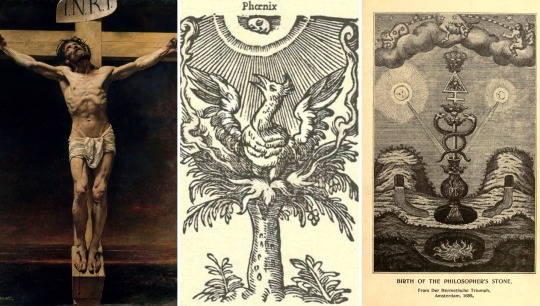
This is the creation of the Philosopher's Stone.
It is symbolically described in "The Chymical Wedding of Christian Rosenkreutz". The book presents an allegorical story divided into "Seven Days" or "Seven Journeys," which tells how its author, Christian Rosenkreutz, was invited to a castle full of wonders to help with the "Chymical Wedding" of the king and queen. Harry also receives a letter in a storm (like Rosenkreutz) and goes to the castle for 7 years, chooses one of the four paths (Gryffindor), and so on.
Alchemists called the creation of the Philosopher's Stone the Great Work – Opus Magnum. This process consisted of three stages: decomposition (nigredo), rebirth (albedo), and final perfection (rubedo). Each of these stages corresponded to a specific colour: black, white and red.
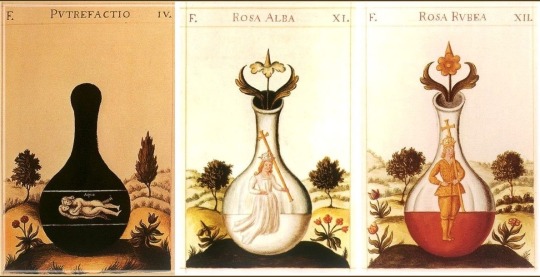
Nigredo. Albedo. Rubedo.
In Harry Potter, these stages correspond to Sirius Black, Albus (white) Dumbledore, and Rubeus (red) Hagrid. The end of each stage is marked by their death. In the seventh book, it's Hagrid who carries the "dead" Harry.
There is a fundamental difference between "true alchemists" and "occult alchemist."
Tom Riddle is an occult alchemist. For him, the Great Work is also self-creation, but what kind? For him, it is complete mastery of his abilities and his future, and especially the complete liberation of his will.
Tom is a will, but his will not submissive to the will of God. It's a Luciferian will. The will of a fallen angel who began to oppose his own free will to the influence of Divine Love-Light. Instead, he sought and loved his own power outside Divinity, in himself.
"Better to reign in Hell, than serve in Heaven" John Milton, "Paradise Lost"
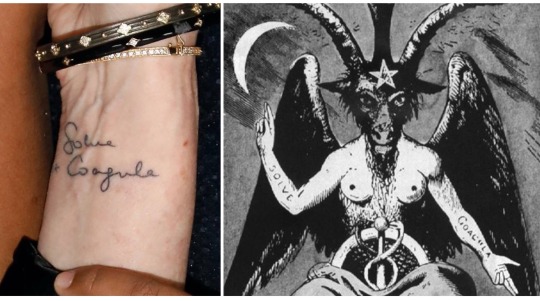
Baphomet, or the Sabbatic Goat, drawing by Eliphas Levi, on its hands are inscriptions "Solve et Coagula." This is an alchemical principle. JKR, by the way, also has such a tattoo.
In occultism, it is believed that magic is control of one's will, and a will can control matter. After all, what did his followers choose for their motto? Magic is Might. Harry never defeated Voldemort with such magic. Because he doesn't need it.
What does Tom boast about? Tom boasts that he has mastered the deepest depths of dark magic. He went so far in it as no one before. Dark magic requires an iron will, and Tom achieved incredible heights in it. He even achieved immortality in this material universe, literally cursing his soul! Only Tom doesn't understand that Dumbledore (a true alchemist) is not interested in all this. Because true immortality is not there. True transformation is not there. Because their paths are completely different – Dumbledore is going to the "God and divine immortality," and Tom is going to "material immortality."
In general, fans of occult alchemy, the Left-Hand Path, and Nietzschean philosophy probably consider Tom a much more interesting character because here he is – the king of matter, a man of incredible will and strength who destroys the slave Christian morality and proclaims that God is dead, long live the Übermensch (homo superior)! (Nietzsche would have been proud of him…) By the way, Bellatrix is most likely symbolically – Lilith, Adam's first wife according to Kabbalistic apocrypha, who rebelled against Adam. God created them equal, and Adam wanted to have power over Lilith... In short, Lilith is the first feminist in human history, hehe.
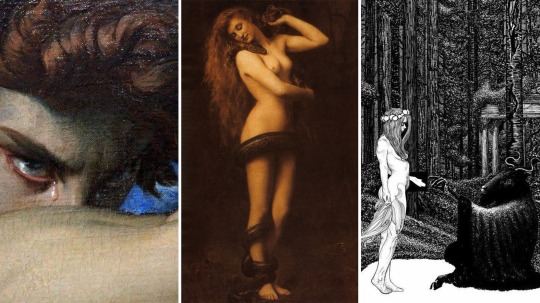
The Fallen Angel by Alexandre Cabanel. Lilith.
In short, Tom Riddle is such an adept of broken alchemy. Where Tom is his own personal will, Harry is Faith and the will of the Spirit. Harry is also very strong-willed, but his will is different, it's not individualistic. It's a will of sacrifice, a will of love, a will of mercy, a will of trust. The main theme of the seventh book is a crisis of faith. And what kind of will does one need to show to continue the quest for Horcruxes and not go for the Deathly Hallows? Simply put, the will of Harry and Tom is completely different.
And Tom will never understand this. He's an individualist. He's a Nietzschean Übermensch. He's reached the limits of human capabilities. But for what? From dust you are and to dust you shall return, Tom...
Severus Snape — a Seaker who chose the wrong Path
And Snape, by the way, initially turns away from Lily (Lily is love of God, represented in the world). Because he's obsessed with becoming dark magic, his ego and desire for secret knowledge and being proud are very great.
Btw, Lily is a mudblood. In the sense that God is not in shining beautiful armor. This is Lucifer's mask – to be pure, to shine, to sparkle. But the real God can be found by seeking, under the feet of the poorest and "dirtiest" person. After all, for God, everyone is equal. It's the Devil who divides.
And pure-bloods, for example, the Blacks, are "false purity." Luciferian purity. Material purity, purity of shining gold. It's division. And where there's division – there's the Devil.
In short, Snape turns away from Lily because this path is difficult, he doesn't understand how to approach her, he already uses dark magic, has a lot of knowledge, and delves into various secrets, and shows what "bad" paths other seekers (the Marauders) take... (The seeker is not my term, it's from the Rosicrucian manifesto, alchemists call themselves seekers) But Lily still refuses to unite Spirit and Soul. And he calls her a "mudblood," insulting her. For Lily, this is a sign that this soul is almost lost. And there's no sincere regret in him when he asks for forgiveness. He asks her to forgive him, but his soul is still on the old Path. Lily isn't angry with him, it's not about anger or offense. Snape's soul is almost lost at this moment, closed to the divine spark and love. After all, for love to enter your heart, you first need to open yourself to it.
Only when Snape sees true face of Tom's "alchemy," in which Tom is ready to kill Love, the divine spark, essentially kill God in the souls of all people, then Snape, as a real Seeker, realizes that he's going the wrong way... And he runs to the main Alchemist, Dumbledore, to ask to preserve this love, this manifestation of God on earth.
But you can't preserve it without preserving the seeker of the right Path in your soul (James) and without preserving the possibility of the emergence of the transformed soul (Harry).
This is a very important moment, not only because you can't kill people in principle. Dumbledore literally tells him that you can't save love of God, the divine spark in your soul, if you kill in yourself the one who reaches out to God (the deer) and if you kill the POSSIBILITY of becoming this new transformed soul (Harry).
For Snape, this becomes a turning point, and he decides to switch sides to true alchemy. Dumbledore asks in return for Snape's soul, but not in the sense that the Devil demands it, he asks for loyalty to the Path. Below I'll explain the symbolism of Dumbledore and what he means in terms of alchemical symbolism (I don’t think he is God).
Snape becomes loyal to Dumbledore. But Lily is killed, as is James. The world, despite the fact that Voldemort temporarily goes into hibernation (and the Savior is alive), plunges into despair. Sirius (as a divine symbol of light) is in captivity, Remus (a symbol of a seeker with a "good but not brave" soul) is somewhere wandering the world, and Harry lives very poorly with the Dursleys... Harry doesn't know any God, and the seeker in him is also "dead". And Voldemort will soon rise again, he's just gathering strength.
Harry's path is the path of returning to God through Mother of God (Theotokos). Because it is Mother of God who is the true Spirit. That's why he meets Lily only at the end of the seventh book, when he's almost completed the alchemical transformation. For Christians, this is heresy, but for alchemists, it's not. The Son and Mother of God are one whole. The Virgin Mary is part of the Trinity, because only through the spiritual unity of the Mother and the Son is the salvation of humanity possible.
And who does he meet her through? Through Snape. Who dedicated his entire life to transforming his Soul, merging it with the Spirit, ultimately coming to God.
He spent his whole life hating James, as a Seeker of a different kind, not like him—Snape always leaned a bit towards Nietzschean stories. And James always hated Dark Magic and all dark things (although this doesn't make the souls of this type much better, they can also be egocentric). Snape teaches Potions, he knows how to bottle up Love, Death and Luck... So much power, so much pride in this...
Recently, I reposted a very interesting post. Snape wanted to recover his soul, because he was guilty of Lily's death. A very beautiful meta, but I see a bit different alchemical meaning. His soul is broken not only because Lily partly died because of him. His soul is broken overall because of the Path he chose - that of an occult alchemist, and he remains a "spy" to the end of his days, playing two roles, constantly "here and there". He dies at the hands of his former master.
Snape takes Lily's letter because he needs Lily's love (like people wear crosses), while there isn't enough understanding of where to go (Dumbledore is already dead)
Snape always yearned for Lily. And Dumbledore asks for us, the readers: "After all this time?" And Snape answers for us "Always." You must love God always. And that is salvation for the soul.
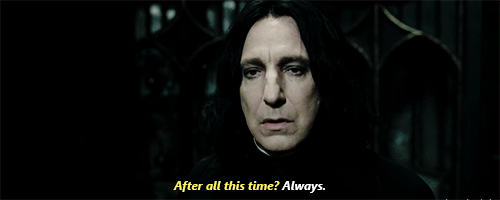
In general, Snape only understands towards the end that you cannot love Lily without Harry and even James. Only one Path leads to Lily - the same as James’s path. The path of Ego, pride, thirst for power, secret knowledge, occultism, malice, hatred must finally dissolve. Snape fully exposes himself to Harry, although he shouldn't have (he should only pass on information about death), revealing the good (and the bad) that he always hid. His revelation to him speaks of his complete acceptance. He shows him his soul, literally bowing his head to him - here I am, here is my soul, in some things I have no excuse, sometimes I have justification, but I've been seeking God, seeking love all my life.
Will you accept my wounded soul?
This is confession. The realest confession.
And Harry accepts. Of course, Harry accepts. He looks at him with Lily's eyes.
Because no matter how "bad" you are, if you truly love God in your soul, if you truly seek Him, there will always be a place for you in the City of God. Snape is the constantly replayed plot of the Prodigal Son's return.
At this moment, all the "black" in Snape dies – the nigredo. Tears - the white stage, purification – the albedo stage, purification. Blood – naturally, the red stage. The alchemical transformation for Snape is complete.
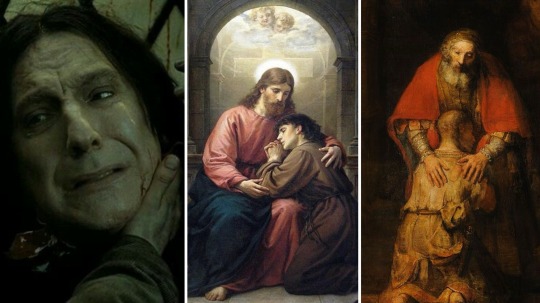
(But geniuses from TikTok will still say that Harry shouldn't have named his son Albus Severus, because Snape was baaaad. Ofc he was bad sometimes, that's the point!)
Dumbledore is the embodied Path and Plan
As I mentioned before, Dumbledore asks for Snape's soul in return, but not in the sense that the Devil demands it, he asks for loyalty to the alchemical Path.
Dumbledore, as an alchemist, besides embodying the completion of the albedo stage for Harry with his death, is also the embodied Path. Dumbledore is the highest Guardian of the Tower, who watches over the Paths of others, he is the Man of Spirit, he is the Principle, he is the Master. What is the difference between Dumbledore and Lily? Lily is a more important symbol, she is like pure divine power, God = love, as in what all souls dissolve. Dumbledore, on the other hand, is the Guardian of the Path through which everyone must pass. In short, Lily is the answer to the question "where", and Dumbledore is the "how". And Dumbledore is just a man who also underwent his alchemical transformation and who can also succumb to temptation. But Dumbledore is not GOD, imo. To personify God in a book is too much (even for me, although I’m not religious at all). I don’t like the idea of him being God and... really, where? God is transcendent and pure divine love emanates from Lily that’s why she almost an empty canvas. Dumbledore is a principle. He is the answer to the question "HOW". That's why he asks to believe in him, believe in the ALCHEMICAL PATH AND PLAN. FOLLOW THIS PLAN TO THE END. Ascend the tower, as I once ascended it. After all, he lives up there in the tower. He observes.
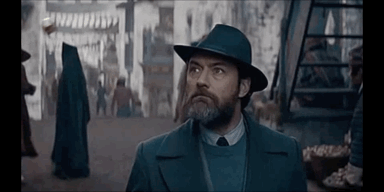
For Snape, Dumbledore is so important because Dumbledore is the Path, a new Path that he did not have. And Dumbledore's death is so important for everyone because now no one points them towards the Path. But they must find this Path within themselves. Because the answers are inside them. You cannot become a true Alchemist if you constantly rely on external help. It's time to see the Path independently.
"You must kill me."
There was a long silence, broken only by an odd clicking noise. Fawkes the phoenix was gnawing a bit of cuttlebone. (HP and DH)
After Dumbledore says that Snape must kill him, there is silence and a very clear symbol - the phoenix and the bone. It's time for their souls to go independently, to eat away all the old to come to rebirth. Meanwhile, they also need to save Draco, who, by "Lucifer's" order, is about to kill the Path (although you can't outplay God's plan...). And then Dumbledore reveals that Harry must die.
This shocks Snape. Like any alchemist on the Path. How so, to die? After all, we all do everything to become closer to God, to immortality, and you say – just die? What kind of Path is this?
"I thought…all these years…that we were protecting him for her. For Lily.”
After all, we were protecting Harry for Lily, because as I've already said, only through the spiritual unity of the Mother and the Son is the salvation of humanity possible. Snape is protecting the son for the mother, and Dumbledore wants to kill him? For what?
Simply put, Snape doesn't understand that no one can save Harry until he dies and is reborn. It's painful, but all heroes go through this path for rebirth.
Dumbledore knows that there is a "seed" of "evil" in Harry, as in any of us. After the fall, we all carry Luciferian part within us. This is the last thing that must die in Harry, and he himself must die for it.
No one promised that the path of the alchemist would be easy. It's understandable why not everyone loves Dumbledore, he seems too cold and manipulative, but there is no other way for Harry on the symbolic level.
The Great Work
There are three stages of the Great Work: decomposition (nigredo), purification (albedo) and ultimate perfection (rubedo). These stages for Harry culminate in the deaths of Sirius Black, Albus Dumbledore, and his own death, where he is carried out of the forest by Rubeus Hagrid.
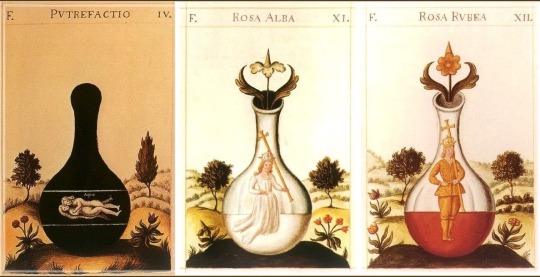
And the result of his alchemical work should be Rebis — essentially the alchemical philosopher's stone, an androgynous being. In the collection of dialogues attributed to Hermes Trismegistus, God is depicted as androgynous. (Hermes Trismegistus is essentially the one who created the corpus of Hermetic texts).
Rebis is the unity of opposites. Day and night, Man and Woman, Good and Evil, Light and Darkness. All is one. There is no division. The wholeness of God. After the fall, we are all divided. And after the alchemical transformation, we can finally become whole and find ourselves and God.
In the form of merged men and women, sometimes depicted as the Virgin Mary and Christ, because They are one whole. As I have already said, for many alchemists, the Virgin Mary is part of the Trinity because only through the spiritual unity of the Mother and the Son was the redemption of original sin made possible. As I have already said, although Harry suffers more for James (his father turned out not to be as ideal as he thought), Lily is the main symbol in "Harry Potter".

The Nigredo stage literally means "blackness" - it signifies complete breakdown, decay, descent into the underworld, the trance of grief. It's a descent into the deepest fears, disbelief, denial, loss of self, anger, aggression. And through this - a return to the prima materia. This is what happens to Harry, "The Order of the Phoenix" is a very dark and depressing book, and with Sirius's death, this stage for Harry is completed. Sirius himself also undergoes transformations, but about this in the next part. The nigredo stage, during which a person's ego dissolves, is agonizing but necessary for further development. After the "I" meets its "shadow" and disintegrates into parts, it will need to be purified and recreated.
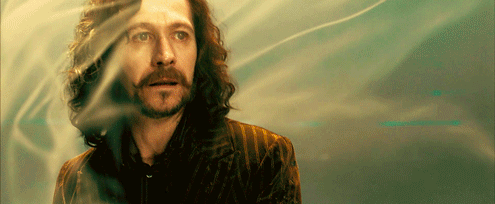
Albedo ("whiteness") symbolizes purification, transition to another world, change of life priorities, awakening, enlightenment. In alchemy, the transition from nigredo to albedo is achieved through the process of washing. The whole sixth book is misty, "white", "wet". "Washing" (albutio, baptisma) directly leads to whiteness (albedo). Purification. It's also silver, a lunar state. In Harry Potter, there is a character named Luna, which means moon in Latin. In different parts of the books, Luna also symbolizes this stage. With Dumbledore's death this stage for Harry completed.
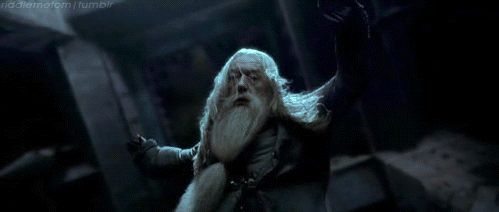
Rubedo ("redness") - the final stage of the alchemical Great Work. The alchemist must establish a kind of sacrificial relationship with his inner essence. At the final stage, the so-called "alchemical marriage" takes place: the marriage of the Red King and the White Queen - Soul and Spirit. Harry (soul) and Lily (spirit) are united. With Hagrid carrying Harry this stage for Harry completed.
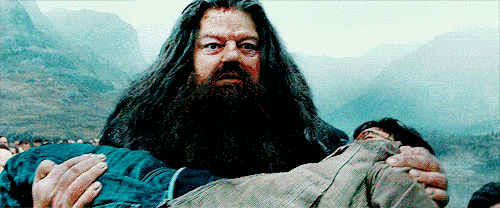
Bu the way, the Golden Snitch is an alchemical symbol also.
Firstly, Harry's position is called the Seeker. Alchemists also called themselves that. Secondly, the winged disc is a very ancient symbol, meaning the sun (God) and immortality.
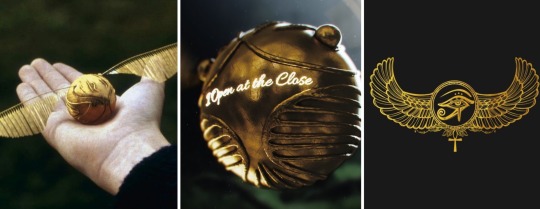
The Snitch reveals to him the Resurrection Stone, and Harry "encounters" his main symbols, but the main one is Lily. It is her he asks not to leave him.
Harry's death here is read by everyone as the well-known plot of Christ's crucifixion. The path to this death is also a reference to the agony of Jesus in the Garden of Gethsemane before the Crucifixion. After all, Harry also wanted to end up somewhere, but Hogwarts is his home, and he accepts his fate.
My Father! all things are possible for Thee: take this cup of suffering away from me: and yet not what I desire, but what Thou desirest. Mark 14:36
He wanted to be stopped, to be dragged back, to be sent back home... But he was home.

Lily's Eyes
To be honest, I can assume that her green eyes was chosen at random. But what if they weren't? Her green eyes may seem illogical, as this is the colour of the snake, the colour of Slytherin, the colour of evil. But this is the occult Luciferian snake, the erroneous snake. Originally, green also dates back to Hermes Trismegistus – the god who gave the knowledge of alchemy. The most famous of the old hermetic-alchemical texts is inscribed on the "Emerald Tablet". According to legend, this document was left by Hermes Trismegistus on a plate of emerald in an Egyptian temple.
"The Emerald Tablet" is very important for alchemists." According to legend, a large emerald fell to the earth from Lucifer's head when he was cast out of heaven. From the same emerald that fell from the crown of the fallen Lucifer, angels made the Holy Grail (which is also the philosopher's stone, and the Snitch...). Emerald is a sacred green stone, and the heavenly divine world - the homeland of the emerald - a precious stone in which information about the heavenly homeland is encoded.
There is also the Ouroboros - a snake that devours its own tail - a symbol of infinity and immortality.
And the Snitch, which is a reflection of Hermes Trismegistus' staff (which has two battling snakes - two opposites, Spirit and Soul, Good and Evil and so on, and Hermes establishes unity between them with his staff).
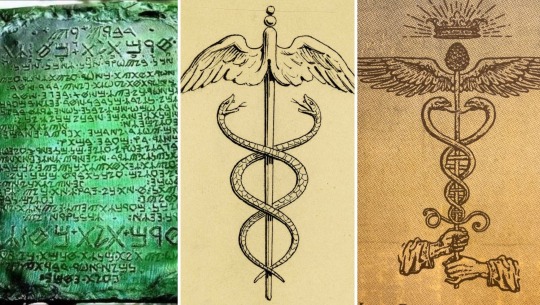
Occultists, of course, interpret these symbols in their own way.
Hermione is Hermes Trismegistus. Mercury. Ron — Sulphur. Harry— Salt.
Hermione (Ἑρμιόνη [hermi. ónɛː]) is a feminine given name derived from the Greek messenger god Hermes. As I said, Hermes Trismegistus is the main figure of Hermetic teaching, he is also the one who predicted the coming of the Savior (traditional Christianity should not be confused with Gnostic teachings, the Church has always been against Gnosticism). In addition, Hermes is Mercury, and that is knowledge. Hermes Trismegistus shares "secret knowledge" with the world, which forms the basis of many Gnostic directions - from alchemy to Kabbalah.
Hermione is a little alchemist, she shares knowledge. It is Hermione who insists on complete trust in Dumbledore, it is Hermione who often leads Harry in the right direction when Dumbledore is not around. It is through Dumbledore and Hermione that "moral lessons" are often sounded, which often seem completely out of place. Like when Dumbledore says that James would forgive Peter. At that moment, I always want to say, "Are you out of your mind?!" although I understand that it is described on a symbolic, not personal level.

Mercury (Hermione), Sulphur (Ron), and Salt (Harry) were necessary in the alchemical transformation and were the main components. To create the philosopher's stone, all three elements had to be combined, and Harry is next to them throughout all the books.
Both Hermione and Ron are equally important in Harry's development.

Mercury is the more fluid primary principle, more rational, the feminine principle, while Sulphur is dynamic, expansive, unstable, acidic, unifying, masculine, paternal, and fiery principle. Sulphur is emotional, it is desire and passionate impulse that motivates life. Sulphur is desire. And according to Jung's reflections, it can also be foul and dangerous. Complete transmutation depends on the correct application of this variable principle. Sulphur must be of quality for transmutation to occur. And Ron achieves this quality.
Also, in mystical alchemy, Sulphur is crystallized inspiration of Mercury (Mercury).
Mercury and Sulphur are simultaneously antagonists, like the male and female elements, but at the same time Sulphur is crystallized Mercury.
So I have always been and will always be for Romione! Hehe. They were made for each other!
And as for Salt - that's Harry. It's the body. Sometimes it is called earth and body, salt is the essential body (corpus).
Alchemists say that salt was the first substance created by fire, emanating from God. In salt, all creation is concentrated, in salt the beginning and the end of all things.
Salt is associated with the ultimate elevation of matter - with matter that has acquired consciousness, achieved through the unity of opposites, including the unity of fire and water, the unity of what is above and what is below. Salt is the ultimate Philosopher's Stone, representing transcendence and ultimate knowledge.
Thus, salt symbolizes consciousness (thoughts, feelings, material, etc.), which must be elevated through alchemical processes of dissolution and recrystallization. Well, that's Harry himself.
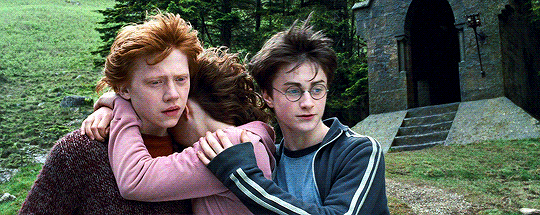
Just love this stupid moment
Well, that's it, I think I've said everything, and from the next part, we can move on to the Marauders themselves :D
#i'm wondering if anyone but me is even interested in this at all#harry potter meta#harry potter#hermione granger#ron weasley#pro ron weasley#rubeus hagrid#pro severus snape#pro albus dumbledore#pro romione#hp meta#severus snape meta#lily evans#tom riddle#voldemort#tom riddle meta#bellatrix lestrange
88 notes
·
View notes
Text
you know, thinking about it, the orphanage is really central to Tom’s character.
without this environment filled with constant isolation and competition, Tom doesn’t need to think he’s better than everyone else. I.e, Tom never has any incentive to develop his grandiose beliefs, i.e, he wouldn’t really have any ambition. He doesn’t need to prove that he’s better (Chamber of Secrets), he doesn’t feel the need to extend his life…honestly, Tom without the orphanage feels like a Harry without the Dursleys. Who ARE you?
#tom marvolo riddle#tom riddle#tom riddle meta#I think Tom didn’t want to accept death because he didn’t want to accept the fact that he was human#but like Tom in a loving home pretty much solves that#assuming you believe Tom is capable of love#and#if you say that Tom without the orphanage is still brilliant I will point you to every other brilliant hp character#wow dumbledore’s a real Tom never could have guessed#harry james potter#anger issues? gone. avoidant attachment? gone. even bravery is debatable imho
39 notes
·
View notes
Note
Tom Riddle Jr. didn't like his mother. He thought that his father was a wizard. He talked more about his father, and almost never about his mother.
I don’t quite agree.
Child Tom and adult Voldemort have different opinions on his parents. Child Tom knows what happened to his mother: she died, whereas his father could be out there somewhere and maybe he’s super cool and powerful! Adult Voldemort thinks his mother was abandoned for being magic, and thinks that his father was the lowest scum of the earth and deserved to die.
Mrs. Cole within minutes of meeting Dumbledore says that Merope was “no beauty” and that they thought she might have been from the circus. I imagine these were things that were either told to Tom, or he overheard at some point. So from child Tom’s perspective, his mother is from the circus and also ugly, whereas his father could be literally ANYONE. He can think whatever grand things about his father that he wants, because there’s no way of fact checking it.
After he meets his father and then kills him, things change. Now Tom only speaks about his father with loathing, and also blames literally EVERYTHING on him. In the Goblet of Fire, chapter the Death Eaters, Voldemort says:
“But he abandoned her when she told him what he was… He didn’t like magic, my father…
He left her and returned to his Muggle parents before I was born, Potter, and she died giving birth to me, leaving me to be raised in a Muggle orphanage…but I vowed to find him…I revenged myself upon him, that fool who gave me his name… Tom Riddle…”
Like half of this is a lie! Merope is the one who named him Tom Riddle, and Tom didn’t have some from-birth revenge plan! There was no vow to find him, he fully thought his father was a wizard for years.
Voldemort pins all of the negatives of his childhood on his father so that he can symbolically break free of them when he kills him. Like how Jesus dies for the sins of humanity, Tom Riddle Sr dies for the tragedy of Voldemort’s childhood, even though it isn’t all his fault. I also think that Voldemort blames his father for everything as a way of excusing the murder. It’s easier for him to deal with if he can blame everything wrong with his life on that guy he killed and therefore not have to have any grief or guilt about it. This blaming also works as a way for Tom to justify his Muggle hating to himself; ‘see my mother was a witch and she was perfect and tragic and died because of my stupid evil Muggle father who hated magic and therefore hated me. So it’s fine I killed him!’
He thinks in extreme black and white, and hatred is much easier for him. I think he talks more about his father because he hates him, which he can express, but he has a harder time talking about his mother because he feels grief, which he doesn’t know how to deal with.
(I also believe that even after learning that Merope was a witch, he still felt abandoned by her. He says “my mother can’t have been magic or else she wouldn’t have died.” But perhaps more interestingly, Harry, who has a mental bond with Voldemort, says “she couldn’t have stayed alive for her son?” I think that Voldemort secretly thinks that. He feels abandoned by her, but doesn’t talk about it because it goes against his wanted world view of ‘muggle father is evil and witch mother is good and could never do anything wrong.’ That feeling can’t fit into his black and white world. I also think that this is why Voldemort has SOOO much disdain for how Lily died to save Harry. Because, why couldn’t Merope? But these feelings are too complex for Voldemort to deal with, so he just doesn’t! He monologues about how he killed his father instead.)
Long story short, Voldemort just talks about his dad more because it’s easier for him to be angry. He doesn’t talk about his mother because what he feels about her is to complex for him to be able to express.
#harry potter#tom riddle#tom marvolo riddle#voldemort#lord voldemort#merope gaunt#tom riddle sr#tomarry#<- just know I was thinking about them when I wrote this#hp meta#tom riddle meta
59 notes
·
View notes
Text
I think it’s so interesting that Tom Riddle seems to have a very different relationship with snakes than the Gaunts do. Morfin and Marvolo have a snake nailed to their door and we see Morfin using parseltongue to threaten an adder with being nailed to the door too if it misbehaves but we never see Riddle mistreat a snake. He speaks about them almost like friends when he tells Dumbledore that they find him.
And when he’s older, yes he’s not that sympathetic when the basilisk is blinded but he’s not actively threatening to it either and certainly speaks more kindly to it than to his other servants. And he’s actively affectionate (for him) with Nagini.
429 notes
·
View notes
Note
‘My Lord,’ said a voice, desperate and cracked. He turned: there was Lucius Malfoy sitting in the darkest corner, ragged and still bearing the marks of the punishment he had received after the boy’s last escape. One of his eyes remained closed and puffy. ‘My Lord … please … my son …’
Wouldn't you say this implies physical aggression on his part? It wasn't Crucio as Crucio doesn't leave marks.
Very unlikely, I think. There are hexes and jinxes that could cause such effects, just like Sectumsempra, which is a combat spell with a very extreme physical consequence. There's also the stinging hex that Hermione used on Harry in DH to desfigure his appearance, and it not only disfigures the target but also causes them pain.
We also have to consider that Voldemort was intelligent and creative enough to have invented several powerful spells. So it wouldn't be out of the ordinary for some, or even most, of them to inflict agony as visually striking as a direct agression, with the visible damage serving as a mark of punishment.
He always took pride in his magical power, in being special, in having found a way out of the precarious, doomed life he grew up with in the orphanage. Magic was both his protection and his weapon, I'd even argue that his style of manipulation is tailored to his magical abilities more than the other way around. He 'shaped' Lord Voldemort around everything about himself that was, at least in his perception, extraordinary. Anything that remembered him to his more human side, the parts he likely associated with his father, a muggle he despised, was rejected. He didn't just consider himself superior to everything that reminded him of his own flaws and humanity, he needed to be superior.
So, I really can't see Voldemort wanting to, or even feeling the need to do anything that might tie him more closely to muggles (non-magical aggression). He already possessed the perfect gift within himself; his natural (magical) talent and his abilities, which set him apart from both muggles and wizards, just as he desired.
21 notes
·
View notes
Note
why is it considered canon that tom is from the east end? It’s hardly the only working class neighbourhood in london and unless I’m mistaken the one piece of textual evidence we have for where he grew up is the diary, which was procured in lambeth. Given that londoners pretty much don’t cross the river going south unless they live there, doesn’t it make more sense for him to be from vauxhall or bermondsey or elephant and castle? (I might just be biased by the idea of bb tom riddle running around doing odd jobs for alice diamond and her gangster friends lol)
I think it's mostly due to East End being more notorious and known globally. At least that would be my guess on why that's the assumption. I actually, too, always assumed Wool's was in the East End, but I wanted to check what we actually know of Wool's location.
Also, as we don't really know how Tom got the diary, he didn't necessarily live in the area the diary came from. So I don't consider it hard evidence either way.
What we do have, is JKR's tendency to write accents and whatever descriptions we are given of Wool's.
Honestly, the orphanage is really odd, since regardless of where in London it was, Tom would not have a room just for himself there, but I digress. What we are told about its location doesn't give us much besides, a little barren, rundown, and looking pretty grim in a bustling street (which fits a lot of places in London, so, unhelpful).
So, we'll look at Tom's accent in his first meeting with Dumbledore:
“You can’t kid me! The asylum, that’s where you’re from, isn’t it? ‘Professor,’ yes, of course — well, I’m not going, see? That old cat’s the one who should be in the asylum. I never did anything to little Amy Benson or Dennis Bishop, and you can ask them, they’ll tell you!”
(HBP) - That's the passage with the most "accent" I could find from him.
This suggests a working class accent to me (not a Brit myself, so I'm working off internet research here). Both for the slang used and the general informality of it, and the words used, but I didn't find something that would really suggest the accent is Cockney specifically (like dropping 'H's or the use of "ain't" or certain vowel shifts).
(Cockney accent is the one historically associated with the East End)
I looked at Mrs. Cole's dialogue as well (to cover my bases), as it's pretty similar to Tom's and they should be from the same area, and while it's definitely working class, I couldn't find strong indicators of Cockney either:
“I remember she said to me, ‘I hope he looks like his papa,’ and I won’t lie, she was right to hope it, because she was no beauty — and then she told me he was to be named Tom, for his father, and Marvolo, for her father — yes, I know, funny name, isn’t it? We wondered whether she came from a circus — and she said the boy’s surname was to be Riddle. And she died soon after that without another word. “Well, we named him just as she’d said, it seemed so important to the poor girl, but no Tom nor Marvolo nor any kind of Riddle ever came looking for him, nor any family at all, so he stayed in the orphanage and he’s been here ever since.”
(HBP)
And there is a character that JKR wrote very obviously with a Cockney accent, and that's Stan Shunpike:
“ ’Choo lookin’ at?” said Stan. [...] “Woss that on your ’ead?” said Stan abruptly. [...] “Yep,” said Stan proudly, “anywhere you like, long’s it’s on land. Can’t do nuffink underwater. ’Ere,” [...] “you did flag us down, dincha? Stuck out your wand ’and, dincha?”
(PoA)
The above experts have basically all the markers of a cockney accent. Shifting vowels, 'H's go missing, words like "'choo" and "dincha", replacing "th" with "ff", etc.
But he doesn't always speak this casually and he does speak more formally when giving Harry the initial introduction to the Knight Bus:
“Welcome to the Knight Bus, emergency transport for the stranded witch or wizard. Just stick out your wand hand, step on board, and we can take you anywhere you want to go. My name is Stan Shunpike, and I will be your conductor this eve —”
(PoA)
So, it's possible Tom and Mrs. Cole are from the East End, but JKR didn't write them with clear Cockney accents like she wrote Stan. I mean, Mrs. Cole got quite drunk in her conversation with Dumbledore, if she had a Cockney accent I would have expected to see letters dropped and vowels shifted like in Stan's first dialogue expert.
So, yeah, Tom grew up in a working class area, but his accent doesn't seem to be Cockney, so you can place Wool's in various areas in London and it's up to your headcanon/iteraputation. Lambeth is actually a very possible location based on the accent and description of Wool's, but there are other possible locations, so, yeah.
#harry potter#hp#hp meta#asks#hollowedtheory#anonymous#harry potter meta#tom riddle#tom marvolo riddle#lord voldemort#voldemort#tom riddle meta#wools orphanage
61 notes
·
View notes
Note
Something I think about constantly is whether or not hogwarts had fagging* before dumbledore took over (and we know there was a history of corporal punishment so, like, doesn’t seem unlikely). And then I wonder about little first year Tom Riddle, with no money and no social support (and being a pretty child) and how badly that situation could have gone for him until he got strong enough to get his own back. Like, irl, that behaviour was not cracked down on in any way until the 1970s and there’s no telling how many young boys suffered terribly from the brutality of public school life. Like, no wonder Tom Riddle grew up to be Voldemort: if anything im surprised more people didn’t. It fucks me up. I don’t think I’ve ever read a fic where the subject is even touched on, and I think that’s because it’s just not talked about, but holy shit, British public schools were awful.
*school sanctioned servitude with a strong possibility of physical and/or sexual abuse of young boys by older students
Damn, I never even knew that was a thing. I think you completely nailed it on the head on why it’s not seen in fanfics, it’s because people simply don’t typically even know about it.
Honestly, it makes sense for British schools considering how much the caste system is/was regarded. I can see it happening in Hogwarts because of this, there are those on top (rich purebloods) and those on the bottom (poor muggleborns/muggle raised kids). Because there’s such a gap and the purebloods are kinda treated like royalty I can see it as a very plausible scenario.
Physical punishments were also highly likely considering it was just a typical thing for the time.
Anyways, this is extremely sad, but I’m glad you sent me an ask about it because I enjoy learning new things, no matter how brutal (especially when it comes to history). It would be extremely interesting to see it written into a fanfic one day and brought up more in media.
It also could explain why Tom becomes so closed off in time to come and refutes all possible positive environments. He’s used to being treated horribly and is used to not trusting anyone, so surrounding himself by shitty people would likely make him more comfortable because he knows how to deal with them. Would also explain why he enjoys using the purebloods as little puppets for his entertainment as Voldemort.
You also already said everything that would make him a target for that type of stuff, so he was likely a victim.
#tom riddle#tom marvolo riddle#hp#hp thoughts#hp headcanon#tom riddle headcanon#hypothermia asks!!#tom riddle meta#tom riddle theory
50 notes
·
View notes